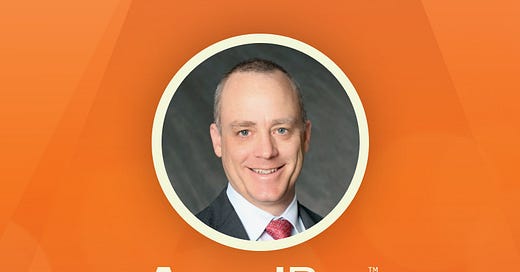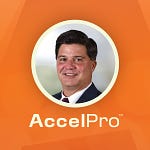Listen on Apple Podcasts, Spotify and YouTube.
Welcome to AccelPro IP Law, where we provide expert interviews and coaching to accelerate your professional development. We are coming to you a day early this week because of the Juneteenth holiday. We’re featuring a discussion on mediation with Mike Strauss, the co-founder of Strauss and Strauss.
This interview is part of our AccelPro Career Tools series, where we explore topics including client relationship management and wellness. The conversation with Strauss was originally recorded for the AccelPro Employment Law community, however, it is relevant to all in the legal field.
He walks us through the steps, skills and abilities necessary to make the transition from lawyer to mediator. Strauss says his years of experience as a litigator have been crucial in preparing him for his new role.
“I wanted to have the credibility that comes from settling eight-figure cases, but also having to negotiate a walkaway for zero dollars because of something coming up that was wholly unexpected,” he says.
“I wanted to be able to step in a room and explain, I’ve won these cases at trial, but I’ve also lost these cases at trial. I’ve won arguments at the court of appeal. I’ve lost arguments at the court of appeal. I’ve even had the court of appeal reversed by the United States Supreme Court in one of my cases.”
Listen on Apple Podcasts, Spotify and YouTube.
Interview References:
Mike Strauss’s Strauss Mediation profile.
15:25 | Resolve Law LA Virtual Mandatory Settlement Conference (MSC) Program.
Supplemental Materials:
Leonard L. Riskin. Understanding Mediators' Orientations, Strategies, and Techniques: A Grid for the Perplexed. (1996). Harvard Negotiation Law Review, Volume 1:7.
TRANSCRIPT
Matt Crossman, Host: We’re going to talk about how you transitioned from being a lawyer to a mediator, and you’re going to offer a lot of practical advice about that. But let’s start with some background. You founded Strauss and Strauss with your wife. What kind of practice is it?
Mike Strauss: Strauss and Strauss is an employment litigation law firm that focuses on representing employees in non–labor employment disputes. So no union type of negotiations, for example.
For the first 10 years or so, we primarily litigated wage-and-hour class actions in state and federal courts, throughout California and sometimes in other states. With the rise of arbitration agreements in the employment context, we shifted our focus slightly to mass arbitration of wage claims and also representing individuals. All along the way, we represented individuals in your run-of-the-mill employment cases, whether they were discrimination, harassment, wrongful termination or retaliation.
Currently, the firm has four attorneys, including my wife, Jenna, and two of-counsel attorneys. Although I’m technically still a member of the firm, I don’t really take new cases. Sometimes, I just have to take a case because I feel for the person. But I’m trying to make a transition to mediation.
MC: What kind of mediation do you do?
MS: I do the exact type of cases that I’ve been litigating for my entire career as an employment lawyer—wage-and-hour class actions, PAGA cases, individual claims like harassment, discrimination, wrongful termination, stuff like that.
The mediation world sometimes requires you to step outside of your comfort zone. So occasionally I will take cases that are non-employment related, like breach of contract or landlord-tenant disputes or personal-injury cases—things that come up where I feel I can help the parties reach a resolution, even though it’s not in the employment world.
MC: I’ve had a number of guests on the show who worked in mediation. But they didn’t make the leap as intentionally as you did. You used your law career to work toward becoming a mediator from the very beginning. I want you to tell me that story because I think that’s really valuable for other people who might be considering a similar move.
MS: I knew I wanted to be a mediator since I was in college. I was fortunate enough to have a father who was an employment lawyer. I worked in his law firm starting at about age 16. Every summer I would come home from college and keep working in my dad’s firm.
In the summer of 2000, he took me to a mediation. He got the parties to agree that he could bring his son. I wasn’t committed at that point to going to law school. It was always something I thought I might end up doing. I think my dad wanted me to see mediation because it might pique my interest and maybe get me on the path to being a lawyer. It worked.
I went to this mediation in Ventura County with a recently retired judge, Honorable Steve Stone. I don’t remember much about the case. I was more of a fly on the wall. I was not allowed to speak when the mediator was in the room. I may have chimed in once or twice to the chagrin of my father. I think the case settled.
I knew at that point that I wanted to be a mediator. I loved the fact that the mediator was trying to resolve a dispute as opposed to propagating a dispute. I loved how he came into the room, got to know everyone, built up rapport, and offered his guidance and helped the parties settle their case.
It was at that moment I knew I wanted to be a lawyer because I wanted to be a mediator. I asked my dad how I could be a mediator, and he said that I absolutely needed to have a law degree and also to have experience. I realized I should go to law school and start working toward this goal.
MC: As you were working toward that goal, one expression you used in describing it to me was “I needed to take my bruises.” What did you mean by that?
MS: This goes back to what I was saying about how you become a mediator. There’s lots of ways to become a mediator, and you’ll see in the field that there are many who haven’t litigated all that long, and there’s others who were litigators for a long time. Some were judges. Very few don’t have a law degree. I always felt like I needed to have the credibility in the room with the parties that comes from having litigated for many years.
I need to step back a little bit and explain why I think that. Essentially there’s two schools of mediation. There’s the facilitative school and the evaluative school. The facilitative school is where the mediator works as an advisor, getting the parties to come together. Ultimately they’re the ones who come up with a settlement.
The evaluative school of mediation is where someone comes in and says, you have a good case, you have a bad case, you should settle because I think you’re going to lose. That’s the pure evaluative method.
I’ve always thought that the most effective mediators blend the two schools. They’re not too evaluative, not too facilitative. I knew that I wanted to come into a room and connect with the parties in the facilitative way but also offer my own opinion as to the strengths and weaknesses of their case.
What I meant by taking my bruises is that I wanted to have the credibility that comes from settling eight-figure cases but also having to negotiate a walkaway for zero dollars because of something coming up that was wholly unexpected.
I wanted to be able to step in a room and explain, I’ve won these cases at trial, but I’ve also lost these cases at trial. I’ve won arguments at the court of appeal. I’ve lost arguments at the court of appeal. I’ve even had the court of appeal reversed by the United States Supreme Court in one of my cases.
Just being able to step into a room and explain the risks of litigation with some of my own experience—I think that kind of perspective offers the parties more guidance as to why they should come together and reach a deal. So if I reveal my battle scars, I think that helps.
Despite my own wanting to be a blend of evaluative and facilitative, sometimes the parties come to me because they know my experience, they know that I’ve seen what I’ve seen, and they want to hear my perspective on the value of their case, and so I think having that experience under my belt is something that is very valuable to me and to the parties.
MC: How intentional were you when you were still litigating cases in picking cases that would help you later on?
MS: When I had my employment litigation hat on, there were two real reasons to take a case. One is the pure financial reason. Obviously it’s a business. I want to make money. But then there was also the part of me that wanted to take a case because I felt like it was the right thing to do. So it was mostly those two functions that caused me to take on the cases that I did.
I wouldn’t take on a case because I thought it might give me more experience to draw on as a mediator. That being said, every single case I’ve taken has offered some kind of value to my career as a mediator.
Just generally, litigating is going to help because you get those battle scars. You also learn how to deal with people—whether they’re your clients, whether they’re opposing counsel, the courts. Generating these relationships with others is probably the most valuable thing that’s come out of my experience as a litigator.
You have to have great relationships with these people later on, and so I learned that you don’t want to burn any bridges as a litigator if you want to ultimately become a mediator. I’m not going to say I was always perfect. I’m human. I’m super-competitive. I’m sure there were times when I did things that people may not have appreciated.
If anyone’s listening, I apologize. The key to success in litigation, mediation, whatever it is—life!—is being flexible and having these relationships with people that are conducive to future interactions that are positive.
MC: I’m going to put you on the spot. Look back on your career and tell me a story where you think, Oh gosh, I wish I could have that one back. I screwed that one up.
MS: I know exactly what I’m going to say. The lawyer that I dealt with on this case, I’ve since apologized to him and we had a good laugh about it.
He was a young lawyer, and I was a young lawyer. At that point in my career, I was representing employers, and he was representing an employee. He sent a letter, and the tone of the letter rubbed me the wrong way. I jumped on it, and I wrote a letter back that was just as snide. It’s not the worst letter you’ve ever seen. I wasn’t using any foul language or anything, but I was sarcastic and rude.
I think a lot of that had to do with the fact that his boss, who has since passed, was a very difficult person to work with and had soured the relationship. I was taking it out on his associate.
When you send a letter like that, you instantly regret it. Later on I had to apologize to the guy, and he understood. I think he told me that his letter to me was also out of line. So we’re beyond it now, and I consider him a valuable colleague in my network.
MC: For an employment attorney out there listening who wants to do what you did to pursue a career in mediation, what’s the first thing he or she should do?
MS: The first thing that you should do if you want to hang a hat or a shingle as a mediator is be confident that you’re ready. People are going to be ready at different points. Some people are going to be ready after just a few years of litigation.
One of my colleagues is just knocking it out of the park with his mediation practice. He started about a year ahead of me, but I think he has less than 10 years of litigation experience. Everyone loves the guy, and he launched his career at the exact perfect time for him.
There’s others out there who are not ready with only 10 years of experience. They need more. They need to be comfortable in their own skin, comfortable with their ability to enter a room and know that people are going to listen to them.
So I would say you have to know that you’re ready before you make the jump. I knew I was ready for a number of reasons.
First, I don’t think I can get much more experience under my belt as a litigator. I was looking around at my peers, people who were my own age and doing this. I know they’re great people. They’re great lawyers. If they can do it, I think I can do it, too. So I thought that I was ready.
Then you have to start thinking about how you’re going to do it. Figuring out the pathway forward has been the most interesting part of all of this for me.
MC: What’s been the biggest challenge about figuring out the path forward?
MS: The biggest challenge is I know myself. I know my skill. I know how I relate to people. But there are so many lawyers out there who don’t know me. I need them to know who I am, to know how I work and to be able to decide whether they want to use me as a mediator.
I found that the hardest thing so far has been getting out there and introducing myself to the world of employment litigators here in California. It’s hard, but I really do enjoy it. I’m having a great time getting out there. I’m very social. Any opportunity I have to go out and meet folks and shake hands is something I look forward to.
MC: Part of what intrigues me about your story is I think it shows a great self awareness. You said something earlier about being comfortable in your own skin. You love the collaboration of mediation versus the competition of litigating. Even though you’re a competitive person, you value the collaboration much more than you want to just fight and claw for every last nickel.
I imagine there are lots of employment attorneys out there who say Yes! That’s me! They’re just now realizing that mediation is a viable alternative to the constant battle to try to win. How do you talk them over to your side? What do you say to them?
MS: It’s easy. There are so many opportunities out there where someone can get experience as a mediator. I’ve been doing mediations or settlement conferences through the LA County Superior Court Resolve Law Virtual MSC (Mandatory Settlement Conferences) Program. What that means is I can log in to my computer and have virtual settlement conferences with parties virtually anytime I want.
You put your availability on a calendar, and they pick you for various cases. You decide whether you want to be the settlement officer or not. And very quickly you can get dozens of these quasi-mediations under your belt. You don’t need many to realize whether you like it or not. I knew that I had chosen the correct path when I started doing these Resolve Law MSCs, because I get a rush when I settle a case.
It’s really strange. I don’t stand to benefit at all out of these. I’m not going to get paid. As a lawyer, I would get a percentage and take a contingency fee if we settle the case. That always feels great. Money’s going to hit your bank account, and that’s a good feeling.
But I get a very similar feeling when I settle other people’s cases. If it gives you that rush, then maybe this is a career for you.
MC: Peer-to-peer relationships seem particularly important to you as you launch this new phase of your career. Is that true? How did you utilize peer-to-peer relationships as you opened your mediation business?
MS: It’s absolutely true that peer-to-peer relationships are fundamental for starting a mediation business. You can have all the training in the world but have no clients. As a litigator, I had millions of people who were potential clients, and it was really easy to advertise. I set up a website. I had a great marketing team. But I was marketing to millions of people.
As an employment mediator, I’m marketing myself to however many thousands of employment litigators there are in California, as opposed to millions of employees. It’s very difficult to market directly to lawyers. There’s only so much advertising you can do.
You actually need these people to know who you are and how you can relate to them. A lot of people look at a mediator as, “do I want to spend a day with this person?” It’s really difficult for someone to decide to hire me as a mediator if all they see is an ad for me on LinkedIn. So having a peer-to-peer connection to these people is critical.
You have to treat the lawyers on the other side with dignity and respect because they’re now my clients, and I like to think that I’m getting business because they saw me as a lawyer on the other side and they saw that I was reasonable. They saw that I knew what I was doing, and that they related to me on a human level.
I need to get people to understand that about me now, and so I’m getting referrals from people who know me. I’m going out in the community, engaging people at conferences and dinners, taking people to lunch and doing networking groups.
MC: As far as I know, you are the only person I’ve ever talked to who could answer this: What is the biggest challenge you have faced as the coach of a high school mountain biking team?
MS: The problem with being a coach of a high school mountain biking team and a lawyer is that you always are thinking about risk and liability. I was always in charge of what trails we were going to go on. Last year in Ventura County, we had massive rainstorms and they washed out a lot of our trails.
It was a really tough season to coach the kids. We had to rely on the trails that were available, and we had all skill levels of riders on our team. There’s this wonderful trail, just the most gorgeous trail, but it has some serious cliffs and drop-offs. If you fell, you would plummet to your death.
I had to weigh the options. Do we do it? Do we not? It’s the only available trail, and the kids have to train. I thought, maybe I’ll ride with the kids who need more help than others. You try to evaluate the kids: Can they do it? Most of them, I thought, could do it.
But then of course one girl fell off the side of the trail, and luckily she didn’t get hurt. It was a very minor cliff. One of the other riders was there and had to pull her up from below. I decided I wasn’t going to do that trail anymore.
MC: Another question perhaps only you can answer. What do mountain biking and mediating have in common?
MS: They can be very similar. That may not be apparent, and I’m glad you asked. When you are in a mediation and the parties are negotiating and you as a mediator are just hitting the sweet spot, you get into this rhythm, this flow.
You’re fully committed, you’re fully concentrating, you’re seeing where the parties are going, and you’re guiding them to the right spot. Everyone’s happy.
It’s really strange. Usually in mediation, you think people are upset. But sometimes, when you reach that flow state, people have this brightness to their personality, They’re happy. As a mediator you’re feeling the same thing. You’re fully concentrating on what’s happening in front of you.
When you’re mountain biking and you’re going down an amazing trail, you get in that same state. You get in the flow, and you’re not thinking about anything else. You’re not thinking about the stress at home. You’re not thinking about what you’re going to have for dinner that night. You’re not thinking about how you’re going to bring money in the door. You’re thinking about how am I going to just guide my way through?
In that respect, the flow that you have mountain biking and mediating is very similar. That would explain why I love to mountain bike, and I try to do it as much as possible. And I love to mediate as much as possible, too.
Listen on Apple Podcasts, Spotify and YouTube.
This AccelPro audio transcript has been edited and organized for clarity. This interview was recorded on December 11, 2024.
AccelPro’s expert interviews and coaching accelerate your professional development. Our mission is to improve your day-to-day job performance and make your career goals achievable.
Please send your comments and career questions to questions@joinaccelpro.com. You can also call us at 614-642-2235.
If your colleagues in any sector of the IP law field might be interested, please let them know about AccelPro. As our community grows, it grows more useful for its members.












